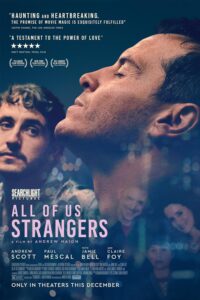
All of Us Strangers
Adam is a gay 40-year-old screenwriter who lives in a London apartment complex. One day Harry, an exuberant young man, knocks on his door and proposes to him with great sentimental and sexual ease, but initially Adam is too reserved and solitary to allow himself the pleasure of this new discovery. Going to visit his childhood home, the man encounters the ghosts of his parents, who disappeared when he was just twelve years old, and at the time unable to accept his emerging homosexuality. His parents appear to him as his peers and as very real presences, with whom he can deal in order to reconnect the threads of a past abruptly interrupted by the accident of which mum and dad were victims. But confronting his own ghosts is not easy for a man who has done everything possible to avoid them, just as he is now doing everything possible to avoid contact with a new possibility of love.
It is really difficult to explain the plot of Strangers because the film written and directed by the British director Andrew Haigh is impalpable and refuses any easy classification, constructing a very delicate parable about regret and the difficulty of coming to terms with the traumas of one’s past and one’s personal insecurities.
Based on the novel “Strangers” by Japanese writer Taichi Yamada, Strangers moves along the labile border of reality without being a real ghost movie, much less a “scary film”, also because the presence of Adam’s parents ( and not only) they appear completely real to us, in flesh and blood, and invite the protagonist to physical contact and material concreteness.
Haigh, both in screenplay and in direction, moves like a tightrope walker between reality and imagination, fantasy and memory, pragmatic acknowledgment and immaterial yearning.
Anyone who has loved and lost, as well as anyone who has feared not being accepted by loved ones, knows Adam’s heartbreak well. Andrew Scott is perfect in embodying the thousand expressions of the wounded sensitivity of the protagonist, who not by chance has the name of the first man, or rather the archetypal masculine.
But stealing the show is (once again) Paul Mescal in the role of the tramp with irresistible sensuality and rough sweetness, (perhaps only apparently) capable of the emotional courage that Adam seems to lack, or rather, that Adam has held for too long under lock and key for fear of judgment from others.
The other acting giant on stage is Jamie Bell in the role of Adam’s father: a man of his time, apparently in the late fifties, accustomed to a traditional concept of masculinity and therefore unprepared to accept his son’s otherness, but not for this reason devoid of genuine love towards him. Claire Foy closes the quartet in the role of Adam’s mother, also a woman of her time, but with a greater openness towards total acceptance of reality – even if only perceived reality.
Jamie D. Ramsey’s photography, under the inspired direction of Haigh, miraculously manages to recreate that dreamlike dimension of the story that helps to suspend our disbelief and manages to evoke the power of our desire to meet again those we have lost, and tell them this that we were not able (or had the opportunity) to say when they were alive. In this sense it is a painful film, but of a pain that heals, reunites and absolves, and helps us to reclaim regret and seek the sweetness of reconciliation, with ourselves and with the microcosm of our affections, past and present. With the same intensity Estranei calls to consciousness the desire for intimacy and connection that contemporaneity pushes us to put aside, everyone locked in their own cell in an urban hive.








